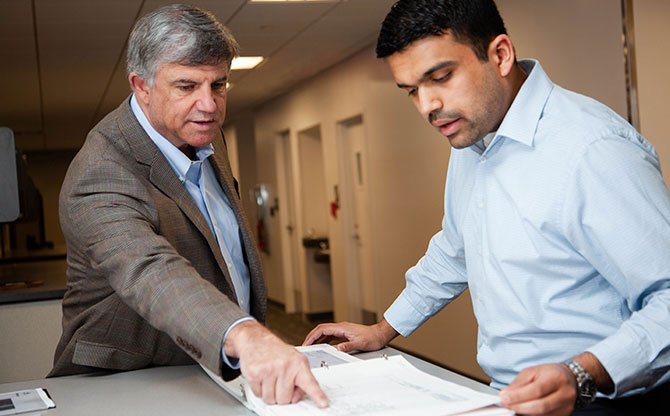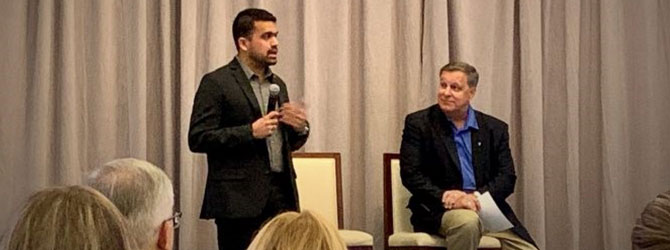I recently had someone ask me if I ever plan on phasing myself out of our Emerging Professionals leadership development group at Dewberry. I was a bit taken aback by the question – I had never thought of leaving the group, even as I advance further into my career. In talking with some of the senior leadership within our organization, it became clear to me that we don’t
have a cutoff date for Emerging Professionals because we are never too old to learn from one another.
A Mutually Beneficial Relationship
Fundamental to leadership is establishing a team where strengths are recognized and everyone learns from each other, including the leader. This mutually beneficial relationship is key,
and by working together, we can make an impact at the organizational level.

Our Emerging Professionals groups have made considerable efforts to take on additional roles and responsibilities within the organization to create opportunities for employee engagement, learn about our business, and give back to our communities—these
efforts have been noticed and recognized by our senior leadership. Our leadership has embraced the idea of learning from staff through a mentor-mentee lens. At a recent company-wide meeting, Chief Executive Officer Don Stone expressed that he wanted
to start incorporating emerging professionals in the strategic planning for the company:
“Our Emerging Professionals teams at Dewberry were founded by a group of engineers, architects, planners, and technical experts eager to grow and test their leadership skills and engage with the company. I think that’s an important aspect
of this program—it’s grass roots. No corporate entity came up with the concept or its structure. It’s proven so popular that we have chapters across the country. Now, the corporate entities are looking to the emerging professionals
for input on how we work. Here’s an example: in January, we rolled out the 2020-2025 Strategic Plan to the company. We really wanted staff to engage and see how they can contribute to its overall success. So, we reached out to the Emerging Professionals
teams and asked them to lead workshops in their offices. They did a great job, pulling multiple disciplines together to talk about the company’s goals. We must prepare the future leaders of Dewberry and our industry. So, by asking them to engage
each other and their colleagues in the plan, we are also teaching them how an organization must think about and lead into its future.”

With support like this from leadership at all levels, emerging professionals across the company were able to contribute to our strategic plan and their business units by helping to present the plan and conduct workshops that promoted discussion around
it. Activities also included working collaboratively to make vision boards that allowed everyone to share their thoughts and innovative ideas that they envision Dewberry could implement over the next five years in a creative way to display across
the office. To Don’s point – these activities allowed for all of us to think creatively and address the questions that our leadership face every day about how we continue delivering high-quality work and win new work with a different perspective.
Moving forward, I hope to see more emerging professionals at all stages of their career get involved in our client development process to learn how we work with clients, win work, and support the long-term needs of that client. This will also help
train staff to give them the necessary experience to prepare for succession planning. Additionally, involving our emerging professionals more in retention of our top talent will be key. Our emerging professionals can support efforts in recruiting,
interviewing, and hiring.
But What about You? Can You Contribute to Your Organization’s Future Success?
On multiple occasions, I’ve been asked by some of my more experienced colleagues if they “qualified” to be an emerging professional, or if they should attend our events. If you have any pause as to whether you qualify to fit in as an
emerging professional in your organization, ask yourself the following:
- Are there things I can still learn that will help my career?
- Are there things I can do to improve?
- Is there another step I can take in my career?
- Are there people here I can learn from?
- Do I have something to contribute to my organization?
- Do I have something I can teach others?
Did you answer yes to any of the above? Well, then you qualify. The potential for growth is limitless. Whatever organization you work for, wherever in the world you are working, and at whatever stage in your career you are, you still have the capacity
to grow and make an impact on your company’s future and the career growth of others.